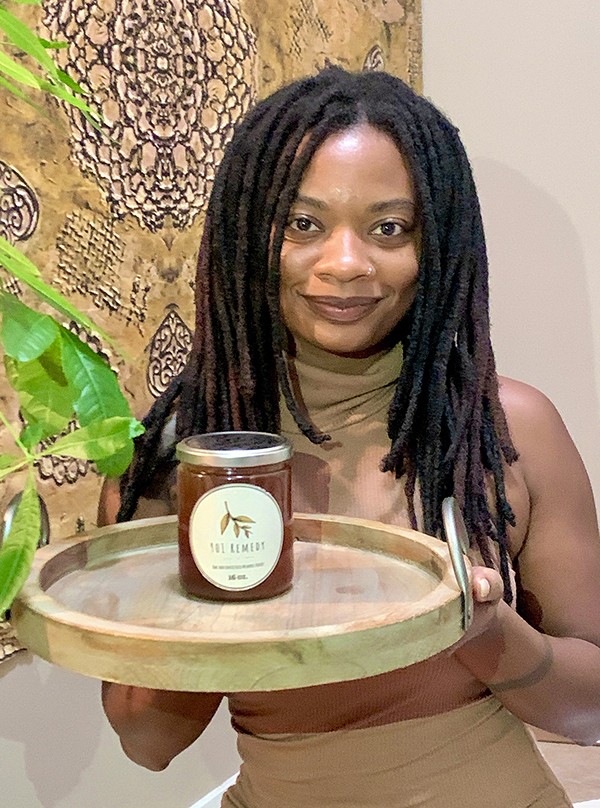Kelsey Johnson was a honey hater.
“I didn’t start liking honey until maybe my early 20s,” she says.
That’s when she began using honey to sweeten her tea. “I fell in love with it. I learned how bad sugar was. I had terrible allergies. Not anymore.
“Now I can even tell what season it’s from. The flavor notes. I guess it’s similar to someone who is a wine connoisseur. I can tell if it’s fall honey versus summer.”

Kelsey Johnson and 901 Remedy honey
Johnson, 25, owner/founder of 901 Remedy, makes her own honey and tinctures. She will start selling her second batch of honey for the fall season and her first tincture on October 21st.
A native Memphian, Johnson began gardening as a child with her grandparents. “Everywhere I’ve lived since I moved out of my parents’ home, I’ve had some sort of garden.”
She learned beekeeping while working at Thistle & Bee, a nonprofit for women who’ve been victims of sex trafficking and prostitution.
Her first job was doing hive checks, making sure there was enough sugar water to get the bees started. “They sometimes need help in the early spring to make it to when things start to bloom.”
She heard the buzzing after she lifted the lid. “I always had this fear of bees. I had to walk off for a second and come back. I looked at the hives, and there was nothing to fear. It was really therapeutic.” And, she says, “I would say being in a bee suit helped.”
She learned about the queen bee, who mates with the drone bees and lays about 20,000 eggs a week, and the worker bees, all female, who “go out and forage for nectar.” The nectar gets broken down into sugars, which are stored in the waxy honeycomb. “Moisture changes the nectar to honey.”
Johnson began attending Memphis Area Beekeeping Association meetings. She got her first hive and ordered two families of bees — “about 10,000 bees.”
She wasn’t sure what she was going to do with the honey. She could make extra money and, if nothing else, she’d “never have to buy honey again.”
The taste of the honey depends on what season it is, she says. “This time of year is goldenrod and aster. In spring, clover. White clover is everywhere. It’s lighter in taste and not as pungent. It has a more robust flavor in the fall.”
She named her business 901 Remedy because of “the healing property of honey.” For allergies and other respiratory ailments, honey has been found “to help the immune system adjust to the local pollen.”
Local honey also is better than most store-bought honey, which could contain high-fructose corn syrup.
Johnson’s fall honey batch, Goldenrod Aster Floral Notes 901 Remedy, comes in 9- and 16-ounce jars. Her tincture is made from the propolis — a resin mixture honeybees make from parts of trees and other plants. “It covers the inside of hives. It’s the bee’s glue to seal cracks to keep out wind, bugs.”
She mixes propolis with high-grain alcohol and “really good glycerine. Pour that over whatever herb you want to make a tincture out of — hibiscus, spearmint, rosemary. The tinctures extract the medical properties every herb has in its highest form.”
Her first tincture is Propolis and Echinacea Throat Spray. “It’s basically an anti-inflammatory immune booster. And I mix it with honey.”
Johnson, who would like to open a brick-and-mortar store, says, “Next spring I’ll be expanding my hives. I’m going from three to nine. So I’ll have more honey. Eventually, I’m going to start selling bulk tea, tea blends.”
Johnson’s biggest challenge wasn’t starting a business; it was “overcoming the fear of getting stung,” she says. “I do get stung.”
She was stung 10 times last summer. “If they sting you once and your ‘smoker’ — the device the beekeeper uses to conceal his smell — is out, you’ll get at least two more. You can’t disguise the scent of being stung. Then they’re out to get you.”
Visit 901remedy.com to order.